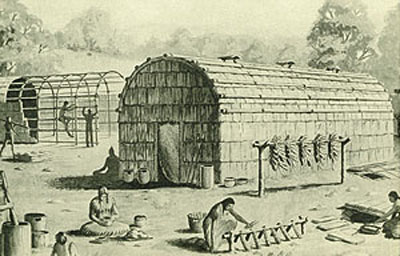Iroquois
 |
Established in either 1142 or 1451, the Five Nations Iroquois confederacy consisted of the Mohawks, the Oneidas, the Onondagas, the Cayugas, and the Senecas. When the Tuscaroras joined in 1712 the union adapted the name Haudenosaunee, which translates to mean the “six separate Indian nations”. In treaties and other colonial documents they were known as the “Six Nations.” While each tribe controlled its own domestic affairs, the council at Onondaga controlled matters that referred to the nation as a whole. Similarly, despite the fact that all spoke the same language, each tribe had a distinct dialect of its own. Thus the Iroquois formed one of the nations earliest and strongest diplomacy’s as well as providing a strong government and military base to protect their farmland.
Though the Iroquois never specifically occupied any part of Pennsylvania their southern conquests from their homes in New York and southern Canada established them as the ruling supremacy over all of the Pennsylvanian tribes: the Andastes, the Lenni Lenape, the Shawanese, the Ganawese, the Conoys and others. As resident viceroy they appointed Shikellimy. (more Shikellimy).
Their military victories were due in a large part to their relationship with European allies. The Dutch began to sell firearms to the Five Nations in 1640 and this new fire power enabled them to begin conquering neighboring tribes. The Onondaga chief, Canasatego encouraged colonists to create union and friendship with the Indians, as the Five Nations did with one another. This establishment has “made us formidable” and has “given us great Weight and Authority” he said (Everts 28).
Due to their practice of adopting prisoners of war, any racial distinction between each tribe or between themselves and the Algonquins was virtually nonexistent. Thus it was the strong sense of identity that was provided through wampum belts, ceremonial chants, daily customs, and oral historical tradition, that made the Iroquois unique.
In terms of spirituality the Iroquois practiced a religion of love. They believed that the Great Spirit Tarachiawagon, which literally means “Holder of the Heavens”, cared for his people and asked that they care for one another. Furthermore Tarachiawagon had appointed to each of the Six Nations its own dwelling place, taught them how to use the corn and fruits of the earth, and could be approached by way of the woods.
Their religion led to a deep sense of brotherhood. Leaders were respected, but were as poor as the poorest. There were no social grades because the tribe shared everything. Words for “your highness”, “your majesty” and “your excellency”, did not exist. The English governor was called “Brother” and Shikellamy, the “great pro-council at Shamokin” died in rags. Thus the true strength of the Iroquois was not exhibited through their military victories, but instead was shown through the large number of allies they had.
A further result of their love and respect was shown through their lack of crime. The Iroquois did not have police and they didn’t need them. Their code of honor was seldom broken because citizens feared public disapproval. Only two crimes were named, theft and murder, and both were punishable by death. Violence committed by drunken men was overlooked because rum was believed to have power that extended beyond human will. Conrad Weiser found that as long as “the rum trader is absent…one can be among them for thirty years or more and never once see two sober Indians fight or quarrel” (Wallace (Weiser) 21).